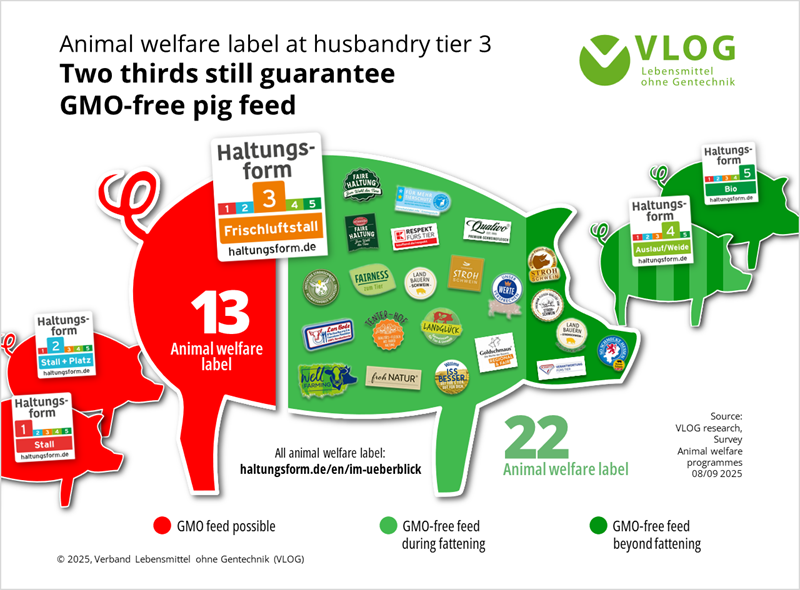News
Husbandry tier 3 for pork: Two thirds still GMO-free
Fresh meat in supermarkets and discount stores now usually displays the voluntary five-tier animal husbandry labelling system (Haltungsform) of the Animal Welfare Initiative. The higher the level, the better the husbandry conditions for the animals. In addition to sufficient space and stable or pasture husbandry, feeding also plays a role in the criteria, which vary for each animal species.
Originally, GMO-free feeding during fattening was mandatory for all animal species from tier 3 onwards. This has no longer been the case for pork for almost a year, and recently it has only been mandatory for all animal species from tier 4 onwards. At tier 5 (organic), as with "Ohne Gentechnik", GMO-free feeding continues beyond the fattening phase. GMO feed is permitted at tiers 1 and 2.
In pig fattening at husbandry tier 3, since November 2024 it has been possible to implement so-called "regional feeding" instead of GMO-free feeding, whereby at least 70 percent of the feed must come from a region defined by the animal welfare programme. However, the remaining 30 percent may also be genetically modified soy from overseas.
"This means that virtually any commercially available pig feed in Germany qualifies as allegedly 'regional'. The perceived regionality in the minimum requirements for husbandry tier 3 is window dressing," comments Alexander Hissting, managing director of the Association for Food without Genetic Engineering (VLOG). "We are therefore all the more pleased that 22 of the 35 animal welfare label programmes of husbandry tier 3 still require GMO-free feed. To make this really clear to consumers, an additional label with the 'Ohne GenTechnik' (Non-GMO) seal would be reasonable."
5 of these 22 animal welfare labels require GMO-free feeding even beyond the fattening stage and thus already meet the basic requirements for the label. A clear majority of consumers explicitly want such a dual labelling, as a VLOG market survey has shown. According to the study, GMO-free status and animal welfare are about equally important to them.
"Only the 'Ohne GenTechnik' seal provides real clarity on the GMO-free status. This is particularly true when the criteria for husbandry labelling are gradually being changed and diluted," says Alexander Hissting. "Anyone who is serious about the regionality of feed can combine this beautyfully with the GMO-free status. No genetically modified crops are grown anywhere in the EU. Sacrificing the GMO-free status for pseudo-regionality, however, borders on consumer deception."
In August and September 2025, VLOG examined all 35 animal welfare label programmes of husbandry tier 3 for pork. Online research and surveys of the seal programmes were used to check which of them still prescribe GMO-free feeding. Initially, only the pork programmes were examined, as the feeding criteria had already been changed in November 2024. The criteria for husbandry tier 3 for other animal species will not be changed until summer 2025 and are therefore not yet relevant in practice.
Anuga 2025 and "Ohne Gentechnik“
"Sustainable Growth" is the main topic of Anuga, which will take place from 4 to 8 October 2025 in Cologne, Germany. "Sustainability as a driver for innovation" is one of seven food trends that will be the focus of the food fair, because "more and more people are paying attention not only to the nutritional value of their food, but also to its ecological footprint." Labels such as "Ohne Gentechnik" and husbandry tier support this.
On the opening day of the fair, the current challenges for the food industry posed by the upcoming EU regulation on new genetic engineering (NGT) will be the focus of the panel debate "New rules for new GMOs: What is in store for the organic and conventional Non-GMO sector?" on the "Organic Stage" at Anuga.
GMO-free feed beyond fattening
| Animal welfare label | Company |
| Schmitz - Verantwortung fürs Tier | GS Schmitz GmbH & Co. KG |
| So schmeckt Hessen - Hessenschwein Saugut | Karl Eidmann GmbH & Co. KG |
| Premium-Fleisch-Qualität vom Stroh-Schwein | Netto Marken-Discount Stiftung & Co. KG |
| Landbauern Strohschwein - Aus Bayern mit mehr Tierwohl | REWE Markt GmbH |
| Strohschwein | Südbayerische Fleischwaren GmbH |
GMO-free feed during fattening
| Animal welfare label | Company |
| Landglück. Gemeinsam für Tier&Umwelt | Dietzels Fleisch- & Wurstwaren GmbH |
| Strohgut – Thüringer Strohschwein | Fleisch- und Wurstwaren Schmalkalden GmbH Thüringen |
| 100 % Strohschwein | Fleischerei Lars Bode |
| Goldschmaus „REGIONAL & FAIR“ | Goldschmaus Gruppe |
| Unser WERTE Versprechen | Hans Kupfer & Sohn GmbH & Co. KG |
| K-Respekt fürs Tier | Kaufland Dienstleistung GmbH & Co. KG |
| Faire Haltung - Zum Wohl der Tiere (Siegelversion II) | Lidl Dienstleistung GmbH & Co. KG |
| Faire Haltung - Zum Wohl der Tiere (Siegelversion I) | Lidl Dienstleistung GmbH & Co. KG |
| Initiative Strohschwein | Metzgerei Esser Gmbh & Co. KG |
| Qualivo Premium-Schweinefleisch | Qualivo Deutschland GmbH |
| Für mehr Tierschutz. Einstiegsstufe | Deutscher Tierschutzbund e.V. |
| Landbauern Schwein | REWE Markt GmbH |
| Fairness zum Tier | Rudolf und Robert Houdek GmbH |
| Tenter-Hof | Steinhaus GmbH |
| WELLFARMING | Vion N.V. |
| frohNatur | Westfälische Fleischwarenfabrik Stockmeyer GmbH |
| Iss besser. Gut fürs Tier. Gut für dich | Willms Fleisch GmbH |

